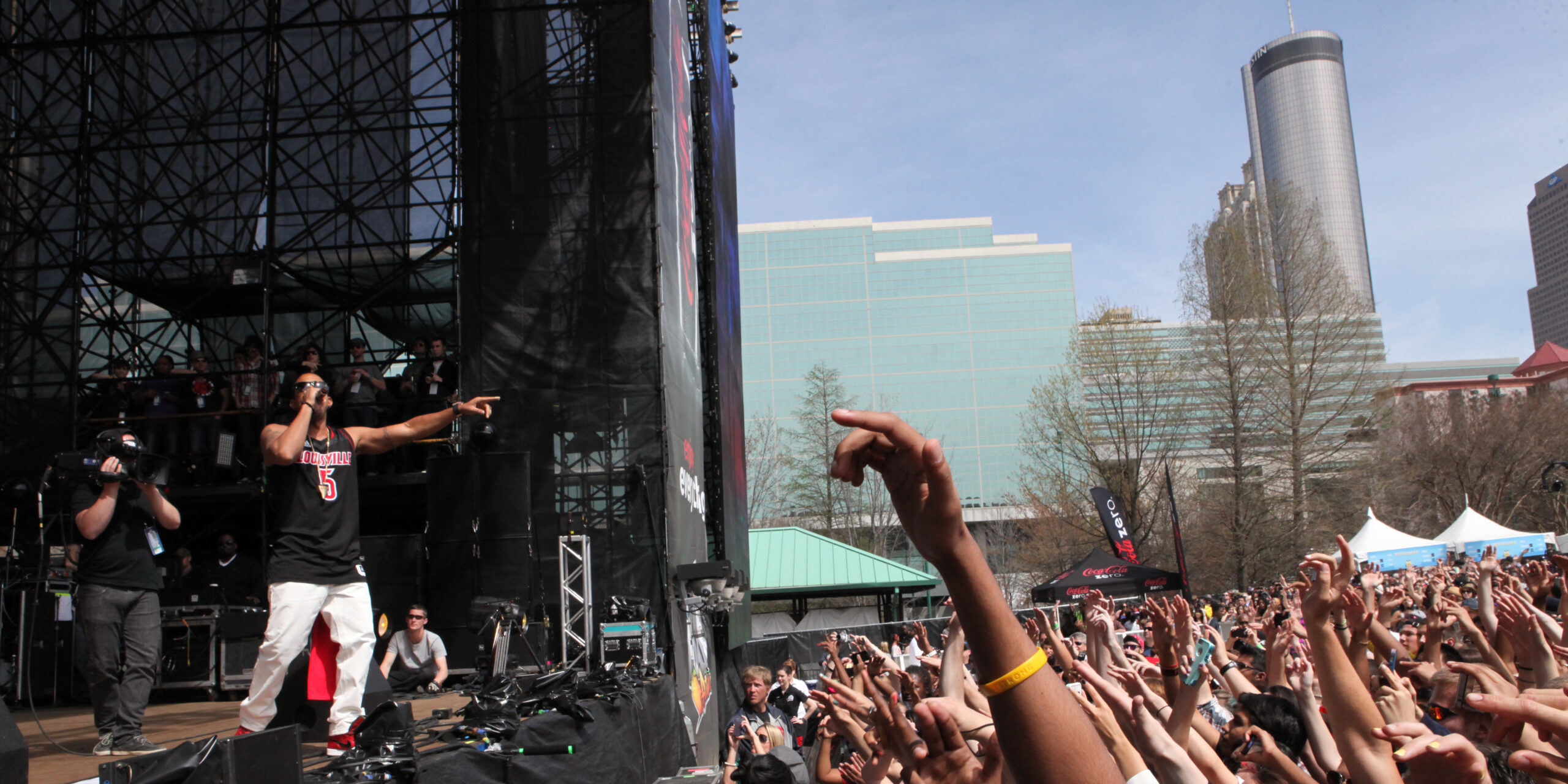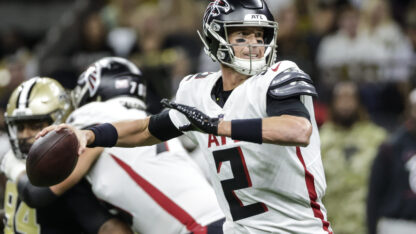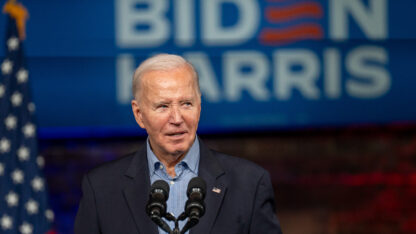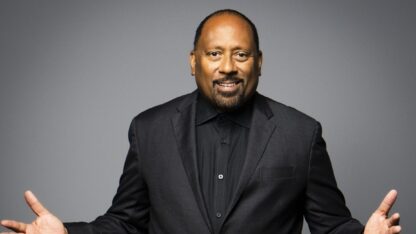Atlanta: 23 Hip-Hop Tracks That Put The City On The Map

Ludacris performs as part of Final Four Big Dance Concerts at Centennial Olympic Park on Saturday, April 6, 2013, in Atlanta. (Photo by Robb D. Cohen/RobbsPhotos/Invision/AP)
Robb D. Cohen/RobbsPhotos/Invision / Associated Press
In September 2015, WABE sent our reporters out to find out one thing: “What defines Atlanta, exactly? Do we have a unique identity?” You can read the rest of the stories here.
Atlanta has been central to hip-hop for years. WABE asked Atlanta’s DJ Drama, Kawan Prather, Bear Sills and DJ Cowboy when they knew Atlanta had made it in the previously New York- and Los Angeles-dominated world of hip-hop.
During our interviews, Kawan Prather and DJ Drama shared their lists of the most iconic Atlanta songs, or the ones that they thought had the most impact. (They both do a bunch of different things, but for the sake of brevity here, DJ Drama produces mixtapes and DJs radio shows and clubs; Prather was in the group PA, is a producer and a member of the Dungeon Family.)
Some of these answers are edited for length. And, yes, a couple of these songs are more R&B or bass than hip-hop. And, again, yes, we changed out a couple of the official videos in favor of the clean radio versions. Having dispensed with those caveats, here are the songs in chronological order.
1988: MC Shy D, “Atlanta That’s Where I Stay”
KP: It was the first song that I heard someone who was not from Atlanta acknowledge how cool it was to be in Atlanta.
1990: Kilo Ali, “Cocaine”
DJ Drama: Before there was a T.I., before there was a Jeezy, before there was a Future, before there was trap music, Kilo Ali was inspiring all these kids to make gangsta music coming from Atlanta.
KP: It was a celebration record because it was fun, but it was also conscious. Because Atlanta is a place where people can be hood and intelligent at the same time.
1992: TLC, “Ain’t 2 Proud 2 Beg”
KP: These were people from our circle, they were on TV, and they were being cool like Atlanta girls are. So it gave the world that kind of, “Oh, Atlanta girls are different, they’re cool like you can kick it with them.” But there was still a point in the song. They were expressing their bossness and their control over their sexuality.
1992: Kris Kross, “Jump”
KP: Two kids who hung out at Greenbriar Mall were discovered by a dude from College Park and they made this song that affected the world so much so that they were on tour with Michael Jackson. So it gave validity to how big hip-hop from Atlanta can be.
DJ Drama: I think Kris Kross’ “Jump” was a huge breakout for hip-hop in Atlanta, for Jermaine Dupri, and just the record in general. A very important part of the story of Atlanta, of Jermaine Dupri, and what was to become in the city.
1992: Arrested Development, “Tennessee”
KP: Although they weren’t from Atlanta, they were extremely Southern in their appearance, so it made that a commercially accepted thing.
1993: Outkast, “Player’s Ball”
DJ Drama: “Player’s Ball” encompasses what Outkast stood for. Here was a record that came out, it didn’t sound like anything else. The video was country as hell, even though it was directed by P. Diddy. It was the first time we all heard Andre 3000 and Big Boi, and that story is golden and the rest is history.
1994: Outkast, “Git Up, Git Out”
KP: I could go with “Player’s Ball,” but I’m going to go with “Git Up, Git Out,” because it was more impactful. It was a little more Southern in the spiritual standpoint and in the honesty of it. And it introduced Goodie Mob as well as Outkast, so it felt like it gave a whole Southwest Atlanta introduction.
1997: K.P. & Envyi, “Swing My Way”
DJ Drama: I don’t feel like you can talk about songs that really represent Atlanta without giving some ode to our bass era and what that meant.
1998: Goodie Mob, “They Don’t Dance No Mo’”
DJ Drama: People really didn’t dance anymore. The Bankhead Bounce had come out, and people were just moving their shoulders. Atlanta is a known city for its club life, and that song really represented where we were at the time.
1998: Youngbloodz, “Shakem’ Off”
KP: It showcased another side of Atlanta that wasn’t so highbrow, it was just straight up fun. It was party music from Atlanta. They were making songs about dances they were doing in the club, like the Shakem’ Off was a dance. And I say influential, because it lends itself to the things that came after from the crunk stuff to Ludacris “Throw Dem Bows.”
1999: Pastor Troy, “No Mo’ Play in GA”
DJ Drama: I remember him performing it at Atlanta’s Hot 97’s birthday bash, and he became MVP. The bill was full of superstars, but Pastor Troy got up there and performed “No Mo’ Play in GA,” it was just a frenzy. That song still to this day, regardless of age, creed or color, if you love hip-hop and especially if you live or are from Atlanta, “No Mo’ Play in GA” is a certified classic.
2001: T.I., “Dope Boyz”
DJ Drama: Before T.I. was the superstar that he was, before the Atlantic deal, that song sat on his first album when his record label wasn’t paying attention to him. You could go to any club in Atlanta and play “Dope Boyz,” and that was it. And T.I. was the beginning of what is now known as Trap Music, which started in Atlanta, was an Atlanta term, and has now gone on to be used everywhere.
KP: It was the first time you heard a voice that represented the trap in a way that gave it a conscience, gave it an identity. It was like it gave it a code. And it was like, it hadn’t been talked about. You heard the word “trap” on Outkast songs, but you didn’t know necessarily what the story was. And it got T.I. to a point where he was comfortable representing that, and he became the King of the South.
2001: Jermaine Dupri Feat. Ludacris, “Welcome to Atlanta”
DJ Drama: That was one of the most pivotal points for Atlanta. Atlanta basically just stuck its chest out, like, “Y’all cool in the West, Y’all cool in the East, but we run this right now.” Ludacris was as hot as he could be. JD is JD, none of us would be here if it wasn’t for him. You didn’t have to be in Atlanta, you could be in New York or L.A. or wherever and the record would come on and it do what it do. It was a great name-dropping record. It encompassed a lot of important things that were going on in the city, or clubs, or places to eat, or strip clubs or people.
2003: Bone Crusher Feat. Killer Mike and T.I., “Never Scared”
KP: That’s the record that introduced T.I. to the world on a major scale, but it was such an Atlanta record, with Killer Mike from Bankhead, and Bone Crusher, who had been in the Atlanta hip-hop scene for so long, and finally got his shot. So it was like seeing these guys come together to support Bone, but in that, launching the career of T.I., “Never Scared” is the epitome of the energy that was happening in Atlanta, where it was crunk, but it was aggressive, and it was Atlanta claiming its space in the world, too. I remember being in New York, hearing “Never Scared,” and recognizing how big that song was. I think it sent an impact on, even how New York people started making their records.
2003: Youngbloodz Feat. Lil’ Jon, “Damn!”
DJ Drama: Atlanta’s had a lot of dance movements, from the Bankhead Bounce to the Nae Nae, that’s one thing Atlanta’s always been known for, is its dancing. Hip-hop is fun, and these are some of the things that keep it fun, are these dances. Youngbloodz’ “Damn!” was a record that was super-hard, super-street and also still came with a dance, it came with the “A-Town Stomp.” So it unified people whether they were in the club or whether it came on in the streets. It just felt so Atlanta.
2004: Usher Feat. Lil’ Jon and Ludacris, “Yeah!”
KP: This is like the pinnacle of Atlanta and its influence and domination of the world. You had Lil’ Jon who just had become the center of attention in pop culture with Dave Chappelle doing a skit about him, and he was already the king of crunk. Then you insert an R&B pop star like Usher onto one of those records, and now it’s getting a different kind of light. And then you bring it back with Ludacris, who is the epitome of the artist you feel good about representing you in front of everyone.
2004: Crime Mob Feat. Lil’ Scrappy, “Knuck if You Buck”
Molly: I’m taking some liberty and adding my own song. I didn’t live in Atlanta when this came out, and it felt like an anthem from home. One more recent moment that sticks in my mind: I came back to Atlanta to see Outkast play last summer (I hadn’t moved back here yet). The DJ played this song beforehand, and it seemed like the entire crowd — it had to be more than 10,000 people packed into Centennial Olympic Park — went nuts. (I ran this by KP and Drama for approval, and they both said, sure, this song could be included. “That was a youth movement,” said Drama. “I’m not mad at that making the list.”)
2004: Gucci Mane, Feat. Young Jeezy and Boo, “Icy”
DJ Drama: It was definitely the introduction to Gucci, and it was still somewhat of an introduction to Jeezy, and it’s two of our biggest stars on one record. It captured a moment. It was huge in the streets, in the clubs, not necessarily something that made it to the charts, but you can’t go anywhere and ask anybody about “So Icy” and them not know the impact that it had.
KP: Two of our most treasured artists came from that. At the time, Lil’ Will who sang the hook, he’s a member of the Dungeon Family, he was probably the most famous person. Him doing that solid for these guys who weren’t necessarily big yet, got him on a song that’s forever a staple in Atlanta history.
2005: Young Jeezy Feat. Bun B, “Trap or Die”
DJ Drama: That song definitely played a major part in my career. As a record, it was bigger than a song, it was a movement. That song, even before the album came out, was everywhere.
2006: Yung Joc, “It’s Goin’ Down”
DJ Drama: Another record that had a dance attached to it. Super-catchy, super-Atlanta, and just caught the world by storm. It was a hit. Everything about it. It was a moment where, you know, “meet me in the club, meet me in the trap,” it still encompasses so much of what Atlanta’s about. Something that so many people can feel from the kids to the parents to the grandmothers, it was a record that really crossed over.
2006: DG Yola, “Ain’t Gon’ Let Up”
KP: Just because it’s my favorite song.
2011: Future, “Tony Montana”
KP: Future, with “Tony Montana,” almost changed the way that people recorded songs. The auto-tune, the way he used it, not like in the T-Pain way, but in a kinda laid-back way, to make it more melodic and seem as though it was rap singing. And it was hard. Future affected Migos, Rich Homie, Young Thug — Future’s “Tony Montana” influenced that.
2012: Future, “Same Damn Time”
DJ Drama: It’s the next generation of our hip-hop megastars. The ones that grew up from Tip, from Jeezy, as well as Future being part of Dungeon Family. It all works full-circle. It’s hard to pick one Future record, but I think “Same Damn Time” is the one that kind of took him out of a regional box and helped him become an international success. And that song just feels like the city, and it felt like the city at that moment. And it was what I call 1:30 music, where you play it at the height of the night.





